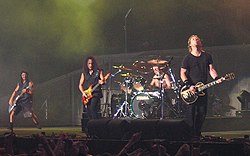

A rock concert is a performance of rock music.[1]
During the 1950s, several American musical groups experimented with new musical forms that fused country music, blues, and swing genre to produce the earliest examples of "rock and roll." The coining of the phrase, "rock and roll," is often attributed to American, Alan Freed, a disk jockey and concert promoter who organized many of the first major rock concerts. Since then, the rock concert has become a staple of entertainment not only in the United States, but around the world.
Bill Graham is widely credited with setting the format and standards for modern rock concerts. He introduced advance ticketing (and later computerized, online tickets), introduced modern security measures (a reaction to the deaths at the Altamont concert) and had clean toilets and safe conditions in large venues.[citation needed]
Rock concerts are often associated with certain kinds of behavior. Dancing, shouting, singing along with the band, and ostentatious displays by the musicians are common, though some very successful rock bands have avoided gratuitous flash in favor of understated performances focusing on the music itself. Even so, rock concerts often have a playful atmosphere both for the band and the audience.
Like rock music in general, rock concerts are emblematic of American culture's waning formality. Such concerts were crucial to the formation of youth identity in the U.S. during a time of social revolution, and have continued to represent elements of society frequently seen as "rebellious," especially against the strictures of mid-twentieth-century social normativities. One of the best-known rock concerts was undoubtedly Woodstock, and millions of much smaller rock concerts go on every year.
The largest rock concert in history was the one Rod Stewart gave on New Year's Eve 1993-94 on Copacabana Beach in Rio de Janeiro. It was estimated that 4.2 million people attended it, although this figure is believed to include those who turned up solely for the fireworks display at midnight.[2]
- ^ "Rock concert Definition". vocabulary.com. Retrieved October 8, 2022.
- ^ "Largest free rock concert attendance". Guiness World Records. Retrieved 6 October 2023.